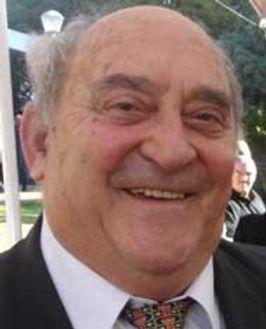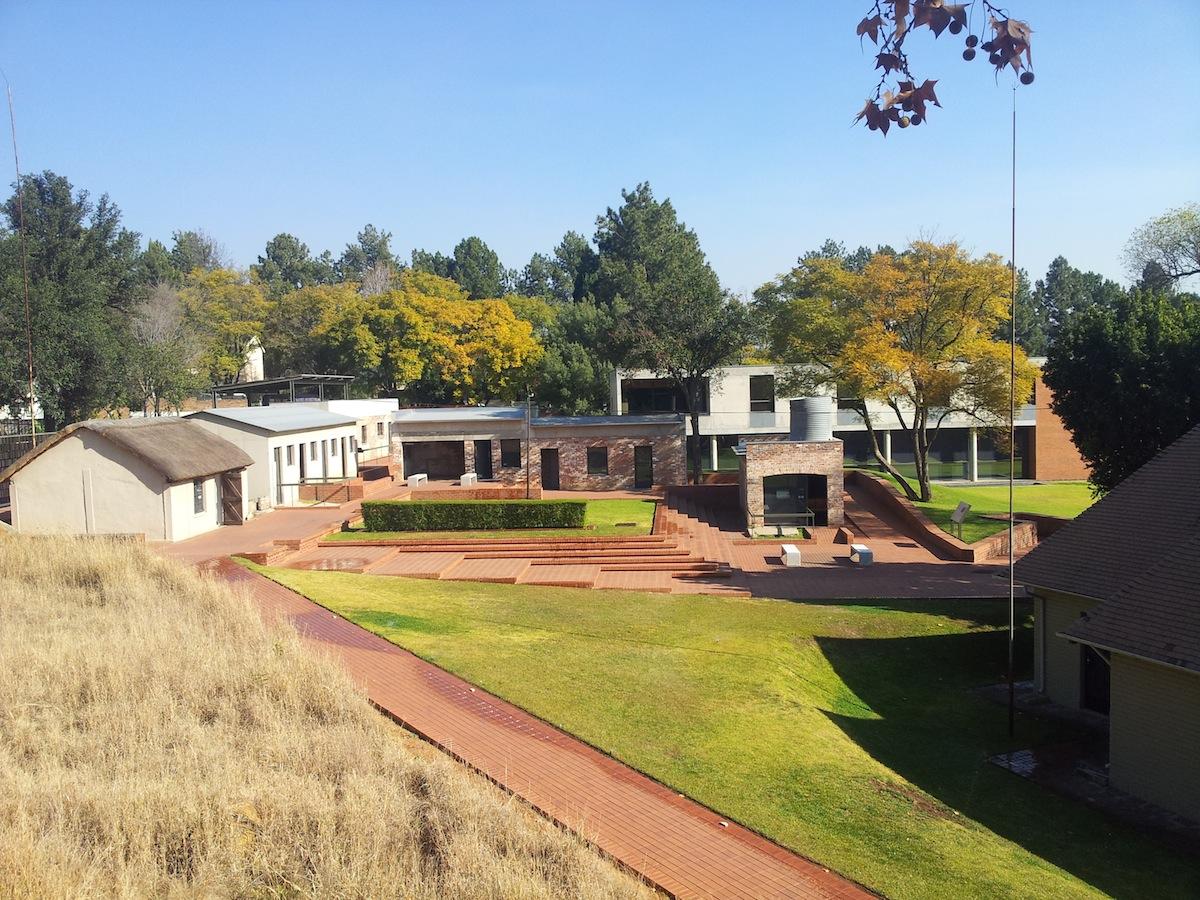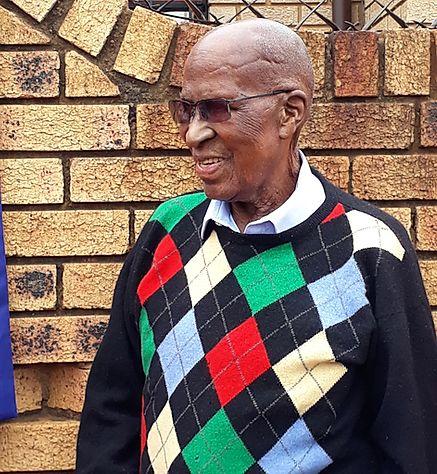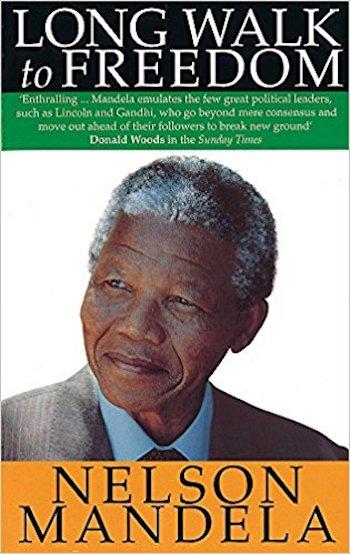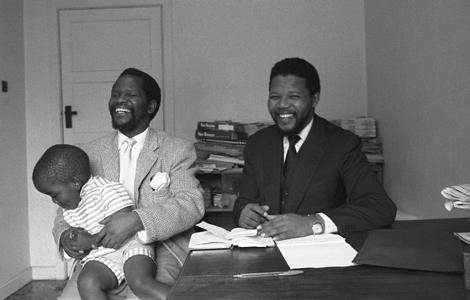
Disclaimer: Any views expressed by individuals and organisations are their own and do not in any way represent the views of The Heritage Portal. If you find any mistakes or historical inaccuracies, please contact the editor.
In the article below, journalist Lucille Davie looks at the painful yet triumphant journeys of the struggle personalities captured at Liliesleaf. The article was originally published on the City of Johannesburg's website on 6 June 2008. Click here to view more of Davie's work.
On hearing that they had got life sentences, Denis Goldberg shouted: "Life! Life is wonderful!"
And life was wonderful on that day, 12 July 1964, because the Rivonia trialists had expected the death penalty, but Judge Quartus de Wet handed down four life sentences to each of the men instead.
"All rationality aside, and for all our preparedness to die for freedom in South Africa, we started smiling in disbelief, at first, and complete relief as it sunk in that the judge said he would not impose the maximum penalty, even though it would be an appropriate sentence," says Goldberg now, 44 years later. "By the time he had finished speaking we were openly laughing. In the end most of us got four life sentences, but in the end you can only serve one of them!"
Denis Goldberg
It meant that they would live, but spend up to 27 years of their lives in jail, not seeing their children grow up, not seeing their wives struggling to hold things together without their husbands, or dealing with harassment by the security police or imprisonment themselves, sometimes with their children.
Eight of the 10 trialists were sentenced to life, while two - Lionel "Rusty" Bernstein and James Kantor - were acquitted. Kantor had been arrested a month after the Liliesleaf raid.
There are only four of the original eight jailed trialists still alive - Nelson Mandela, Denis Goldberg, Ahmed Kathrada and Andrew Mlangeni. Govan Mbeki, Walter Sisulu, Elias Motsoaledi and Raymond Mhlaba have died. (2020 update: Nelson Mandela died on 5 December 2013, Ahmed Kathrada died on 28 March 2017).
Liliesleaf farmhouse and the outbuildings in Rivonia, where the trialists were arrested and Mandela lived for a time, have been restored. Two new buildings on the site, the Liberation Centre and the Liliesleaf Resource Centre, have been built, and together with the new buildings, it promises to be an exciting addition to the city's museums.
Arrest at Liliesleaf
The South African Communist Party had bought Liliesleaf farm, some 25 kilometres from the CBD, in 1961 to use as its headquarters (see main photo). In those days it was a quiet, 28-acre smallholding on the outskirts of Johannesburg.
Goldberg, a civil engineer, describes Liliesleaf as having an "exhilarating atmosphere".
He elaborates: "We ate, slept, dreamed, worked at how to make a revolution. That is what we did. That is why it was exhilarating. Buying a Kombi, buying a farm, moving house, sorting out weapons manufacture, where to get the things needed, how to buy them, how to transport them, how to train people, endless problems to solve.
Some of the outbuildings at Liliesleaf (The Heritage Portal)
"Sorting out getting passbooks signed without giving away where we were was a problem."
Mandela lived there in disguise, as David Motsamayi, a gardener and cook. He recalls in his autobiography, Long Walk to Freedom: "The loveliest times at the farm were when I was visited by my wife and family." He says they were times of more privacy than they ever had at their tiny home in Orlando West, Soweto. "The children could run about and play, and we were secure, however briefly, in this idyllic bubble."
But it was not to last.
The top leadership of the ANC were arrested at Liliesleaf on 11 July 1963. The apartheid government was smug - they had seized and put away for life the top echelons of the African National Congress, who they had caught hatching Operation Mayibuye, the plan to switch to violence to overthrow apartheid.
When the police swooped on the farmhouse they arrested Sisulu, Mbeki, Kathrada, Goldberg, Mlangeni, Lionel "Rusty" Bernstein, Mhlaba and Bob Hepple. Arthur Goldreich, who was ostensibly the owner of Liliesleaf, drove into the farm shortly afterwards and was arrested along with the others. Goldreich made a dramatic escape from prison, together with Harold Wolpe, Mosie Moola and Abdulhay Jassat, crossing the border shortly afterwards.
Mandela was already on Robben Island, serving a five-year sentence for inciting workers to strike, and for leaving the country without a passport. Mlangeni and Motsoaledi had been arrested on 24 June and were charged for being involved in sabotage and trying to leave the country illegally but were charged anew with the Rivonia trialists.
Hepple was Mandela's lawyer in 1962, also representing Sisulu and other ANC and Pan Africanist Congress leaders. He managed to escape over the border before the trial.
Professor Sir Bob Hepple, now retired Emeritus Master of Clare College and Emeritus Professor of Law at the University of Cambridge, and currently judge of the United Nations Administrative Tribunal, sitting in New York and Geneva, recounts the events on the afternoon of the arrest.
"At about 3.15pm, 15 minutes into the meeting, a van was heard coming down the drive.
"Govan Mbeki went to the window. He said: ‘It's a dry-cleaning van. I've never seen it before.' Rusty Bernstein went to the window and exclaimed: 'My God, I saw that van outside the police station on my way here!'
"I moved to the open door and saw the panel of the van, which read Trade Steam Pressers. I could see a man wearing a white coat, hat and glasses on the front seat. I pulled the door closed. A few moments later I heard dogs barking. Rusty shouted: 'It's the cops, they're heading here.'
"Govan had collected up the Operation Mayibuye document and some other papers and I saw him putting them in the chimney of the small stove in the room. The back window was open, and I helped Govan, Walter Sisulu and Kathy (Kathrada) to jump out of it. There was a second or two as I moved back near the door, with Rusty next to me and Ray Mhlaba sitting next to the window.
"The door burst open. D/Sgt Kennedy, whom I had cross-examined in a political trial earlier that year, rushed in: 'Stay where you are. You're all under arrest.'
"He walked up to me with an excited sneer: 'You're Advocate Hepple, aren't you?'"
Hepple was the chair of the youth section of the Congress of Democrats, which was part of the anti-apartheid alliance in the 1950s. He was a member of the secretariat which serviced the central political leadership of the ANC.
He says that he had been anxious driving to Liliesleaf, or Lil's place, as it was called, from his chambers in the CBD. "My anxieties led me to stop more than once to ensure that I was not being followed. I took a secondary road to avoid passing the Rivonia police station."
He'd had a visit from a "mysterious man" who had appeared unannounced at his chambers that morning, with a message from the Natal leadership for the central underground leadership. "Ever since Mandela's arrest there had been suspicions about a possible police spy and lax security in Natal. I feigned ignorance and told him to come back the next day. I intended to check his credentials at our meeting at Lil's place that afternoon."
The leadership were worried about the police discovering Liliesleaf farm, where they had been secretly meeting and living for the past two years. In fact, a new property had been bought, a smallholding called Travallyn in Krugersdorp, and Goldberg had moved into it along with Sisulu, Mbeki, Mhlaba and Wilton Mkwayi. It was to become the new ANC headquarters but the next meeting did not take place there.
"It could not take place at Travallyn because that would repeat the security failure of bringing people to the place where the leaders of MK [Umkhonto we Sizwe, the armed wing of the ANC] were living in secrecy," says Goldberg now, referring to Liliesleaf.
"They could not at that moment decide on a safe venue, therefore they decided to have one more meeting at Liliesleaf," he explains. "It was the pressure of the security police surveillance and the house arrests, banning orders etc, that led to the fateful decision."
Solitary confinement and jail
Immediately after the arrest Hepple spent almost four months in solitary confinement, like the other Rivonia arrestees, before being offered freedom from prosecution if he turned state witness. He agreed to do so but as soon as he was released from jail he escaped across the border with his wife, making his way to England, where his young children and parents joined him later.
Hepple, like the others, found his jail time hard going.
"In the long hours of isolation and boredom, especially as I lay awake at night on the cold stone cell floor, I became obsessed with our predicament. As the days and nights slowly passed I became increasingly confused and created my own world in which reality and fantasy were hard to separate.
"Threats and promises made by the police during continuous periods of interrogation became distorted out of all proportion in my mind and my capacity to reason was seriously impaired.
"I say this with hindsight, because one of the consequences of sensory deprivation and exhaustion is that one is unable to realise the extent of the changes taking place in normal behaviour."
Mlangeni spent 26 years in prison, with his fellow Rivonia trialists, on Robben Island. He used simple methods to get through the low moments in prison. "I personally would take out the letters I received from my wife and read them over and over again. Look at the photographs I received and that helped me to get myself together again and go back to my studies."
Mlangeni became a politician on his release, and is still a member of parliament.
Andrew Mlangeni
Goldberg says it took discipline and determination to get through his 22-year prison sentence in Pretoria Central Prison. He did not go to Robben Island like the others because he is white.
"I believe it was our self-discipline and determination to uphold our dignity, to demand respect, and that the warders act within their own rules, that was the key to survival. We found ways of creating our own little world of politics and social contact that enabled us to support each other.
"For myself, too, there was the sense of living time day by day. Time was flexible: at Christmas and New Year another year stretched out ahead, and suddenly it seemed the year was over. This was more so for lifers who had no release date."
He describes waking up at 5am, washing in a hand basin in his cell, using the bucket toilet in his cell, then eating a breakfast of watery mealie meal porridge, with a chunk of bread and coffee, which consisted of burnt mealies and chicory.
Days were filled with sewing mailbags in the exercise yard, which was freezing in winter and burning hot in summer.
Lunch was "some kind of stew", supper was powder soup, bread and coffee. "In total each day we were alone in our cells for 16 to 18 hours."
Kathrada says in his book, Memoirs: "Nothing could have prepared me for the enormity of losing all choice in such mundane matters as deciding when to wake up and when to sleep, or comprehend that minor joys such as letter-writing and meetings with family and friends would be so severely curtailed and controlled, and that fundamental human rights would become privileges that had to be earned and were always under threat of removal."
Kathrada has been honoured with awards and honorary degrees; while in prison he obtained several degrees. In 1999 he published his Letters from Robben Island, and is presently working on another book. He is retired but consults to the Nelson Mandela Foundation.
Mandela describes Robben Island as the "... harshest, most iron-fisted outpost in the South African penal system". Being placed at Robben Island was "like going to another country. Its isolation made it not simply another prison, but a world of its own, far removed from the one we had come from."
He says that in Pretoria Central Prison, from where they were flown immediately upon being sentenced, they had felt connected to their families and supporters, but on the island, although they were together as a group, it was little consolation. "My dismay was quickly replaced by a sense that a new and different fight had begun."
That fight involved the Afrikaans-speaking warders demanding a master-servant relationship. "The racial divide on Robben Island was absolute: there were no black warders, and no white prisoners."
To get through the long hours he dreamed about being able "to go to my office in the morning and return to my family in the evening, to be able to pop out and buy some toothpaste at the pharmacy, to visit old friends in the evening", he says in Long Walk to Freedom.
Mandela also cultivated a vegetable garden. "I had a garden, which I looked after, and when the tomatoes were ready, the warders would be very friendly and come and get some tomatoes from the garden," he recounts with a mischievous smile in a 2006 interview.
It was to be a long, hard 18 years on the island before he was moved to Pollsmoor Prison, then Victor Verster Prison, just outside Cape Town, for nine more years, before being released in February 1990.
At Victor Verster Prison he got to swim with the warders. "The warders were not allowed to swim, but they would have a guard and then swim; we would swim together."
The world on release
Goldberg says that the world he entered in 1985 was very different from the one he had left in 1964. "The world was different after 22 years. Colours were brighter, everything moved faster, I flew in a jumbo jet, I wasn't sure of how to deal with the outside world."
Goldberg lived in England after his release, representing the ANC in exile and continuing his anti-apartheid activities. He settled in Cape Town in 2002, where he became special adviser to the Ministry of Water Affairs and Forestry. He is now retired.
Kathrada's release from prison was marked by "life-changing news" in the form of a simple question: what is a fax?
"We had read and heard about this strange new contraption, but none of us had ever seen a fax machine or message, and we simply could not grasp the concept of a sheet of paper being transmitted by telephone, and an exact replica arriving within minutes thousands of kilometres or several continents away."
He was inundated by family and well-wishers when he arrived at his brother's house in Lenasia, Johannesburg.
"Except for a few indelible memories, most of that first day has always been a blank," he says in Memoirs. "My most precious recollections are of my little grand-nieces and nephews, clambering all over me, clasping their little arms around my neck, holding my hands, hugging and kissing this strange man they had never seen, but had learnt to love in absentia.
"After 26 years on my own, no other welcome could have meant as much as this spontaneous display of unconditional love and immediate acceptance."
His first television interview brought another surprise discovery. He was confronted with "a cyclindrical, black, hairy object that was pushed into my face. I learnt very quickly, that day, that this was a ‘boom', and that I was expected to speak into it".
Mandela had equally been surprised when first confronted with a boom when he walked out of Victor Verster Prison, thinking it a "newfangled weapon" developed while he was in prison.
Mandela arrived on Robben Island in the prime of life - he was 44 years old. He left prison as a 71-year-old man.
He walked out of Victor Verster Prison on 11 February 1990 to thousands of assembled people, hundreds of photographers, television cameras and journalists. He says in Long Walk to Freedom: "When I was among the crowd I raised my right fist, and there was a roar. I had not been able to do that for 27 years and it gave me a surge of strength and joy."
Book Cover
His first night of freedom was spent at Archbishop Emeritus Desmond Tutu's house in Cape Town. "We were led inside the house, where more family and friends met us but, for me, the most wonderful moment was when I was told that I had a telephone call from Stockholm. I knew immediately who it was. Oliver Tambo's voice was weak but unmistakable, and to hear him after all those years filled me with great joy."
Mandela says that in his 27 years in prison, he held "a life-long conversation with him in my head", and that when Tambo died in 1993, he felt like the "loneliest man in the world".
Old photo of Tambo and Mandela
He had a very busy post-release schedule. "I began a tour of Africa, which included many countries. During the first six months after my release, I spent more time abroad than at home," he recounts. "Nearly everywhere I went there were great enthusiastic crowds so that even if I felt weary, the people buoyed me. In Dar es Salaam I was met by a crowd estimated at half a million."
It was reported that a million people greeted him on his ticker tape parade in New York.
Mandela is now retired, enjoying his grandchildren and great grandchildren.
Update: 27 January 2020
Nelson Mandela died on 5 December 2013
Ahmed Kathrada died on 28 March 2017
Lucille Davie has for many years written about South Africa's people and places, as well as the country's history and heritage. Take a look at lucilledavie.co.za
Comments will load below. If for any reason none appear click here for some troubleshooting tips. If you would like to post a comment and need instructions click here.

